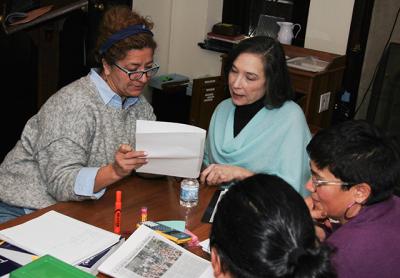Chance at Diploma That Eluded Them

Beatriz Rivas grew up in Mexico, where she married at 15 and did not have the money for books or the monthly tuition to attend high school. Noemi Sanchez, also from Mexico, had her first daughter at 16 and could not afford to continue past sixth grade. Sandra Jácome went to university in Ecuador for three years but could not afford to complete her degree.
“I never lost interest in finishing,” Ms. Jácome said.
Now living on the South Fork, Ms. Jácome, Ms. Sanchez, and Ms. Rivas see the chance to get the degrees that eluded them when they were younger. The three are among 18 people — all but one of them women — preparing for their high school equivalence exams in a pilot program at the East Hampton Library. Conceived of and taught by Celia Josephson, a lawyer who also teaches English as a second language at the library, the equivalence class meets each Saturday from 9 a.m. to 5 p.m., with an hour for lunch. It is taught in English and is open to any adult studying for the Test Assessing Secondary Completion. Materials and instruction are free, and students work at their own pace, taking the exam when they feel ready. If they have to miss a class, it’s no problem, Ms. Josephson said.
A volunteer E.S.L. teacher at the library for two years and a paid teacher for another three, Ms. Josephson came to understand that many of her students had not obtained even a middle school education in their native countries. There are various cultural reasons for this, she said, including an assumption in rural communities that women will marry young and have children young. In addition, in Mexico and some Central and South American countries, a high school education is not mandatory and has to be paid for privately, putting it out of reach for many.
The pilot TASC prep class was a direct result of her epiphany.
Part of the learning curve for Ms. Josephson as a teacher is “to find out what the students are coming from and what they need. Once you know that it becomes easier to meet the need.” Most of the women in the TASC class (and her E.S.L. classes, too) have had children and are eager to complete “the education they never received.”
Ms. Josephson researched the materials she thought were best — texts by Kaplan and by Pearson and calculators. Online videos teach students how to use the calculators. Students learn grammar and idiom through newspaper articles, which are often “stories in which they can identify with the participants in short dialogue,” ultimately helping them with the civics portion of the exam they must take, as well as with essay writing.
And, since idioms are often incorrect grammatically, she tries to flesh out the grammar for her students, which is also something that reading articles can help with. “I liken becoming fluent to getting to the top of a mountain,” she said. And, she added, “pride in being able to speak a language perfectly is a roadblock to learning it extremely well.”
Ms. Josephson learned Spanish in Mexico during a gap year when she was in her early 20s by watching Spanish language television. Even though she teaches the prep class in English, knowing Spanish comes in handy because she can explain an English word or phrase a student might be having trouble with.
To pass the English language portion of the test, students have to pass reading and writing assessments, which include demonstrating a grasp of grammar. Other subjects are math (no calculus but some statistics and probability theory), science (some physics, biology, and chemistry), and social studies, which include United States history and civics. Aside from the English-language subjects, students can take exams on the other subjects in their own language.
There was an atmosphere of relaxed concentration during a visit to one of the classes last month. Ms. Josephson is a patient and natural teacher, and her students clearly appreciate her drive to help them achieve their goals. “Being with our teacher is the best,” said Ms. Rivas in Spanish. “Being away from your routine in such a pleasant, concentrated, and nice atmosphere makes the time pass quickly. Her classes help many people.”
Ms. Rivas is also in one of Ms. Josephson’s English as a second language classes and before the prep class had officially begun last month, Ms. Josephson gave her the TASC textbook as a gift. “It’s the best present for 2019,” said Ms. Rivas, “to be able to come here and have a new goal in our lives.”
Students take the classes seriously, but they also enjoy themselves. In her E.S.L. classes, participants often volunteer to bring in hot food for holiday parties. For Valentine’s Day, her TASC class made food for lunch. “There is a really good feeling to the cultural tradition of sharing food,” Ms. Josephson said, and people seem to learn better when they’re having fun.
“I feel a connection between her and me that helps me feel safer,” Ms. Jácome said. She is also grateful that the library “would support the Latino community by letting them use this space.” She would like to go on to study accounting or be a nurse, she said.
There are still openings in the prep class, which runs through June, and if the pilot class is a success, a second section may be offered. Registration is by calling the library at 631-324-0222, extension 3.
